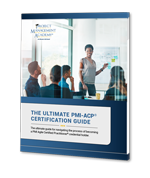Most project managers strive to earn PMI’s Project Management Professional (PMP)® certification. Those seeking Agile training, an Agile PMP Certification equivalent, or other project certification should include Agile methodologies into their training and PMP certification knowledge base. The Project Management Institute (PMI) predicts there will be 2.2 million project-oriented roles annually through at least 2027. The use of the word “project-oriented” is very deliberate as those working in Agile know there are project roles related to Scrum, Lean, Six Sigma, and other Agile methodologies not called a project manager. To learn about Agile is to prepare for the PMP® certification exam and to grow a competitive professional skill set.
On this page:

Download the Ultimate Guide to learning about the PMI-ACP Certification.
Agile Project Management
At the core, Agile project management is an iterative approach focused on ongoing improvements throughout a project to maximize the potential value. The origins are the Agile Manifesto issued in 2001 by a team of passionate IT professionals seeking a way to work that reflected their technology-driven environment in ways traditional (or “PMP” style) project management was failing to do. As the Association for Project Management shares:
“One of the aims of an agile or iterative approach is to release benefits throughout the process rather than only at the end. At the core, agile projects should exhibit central values and behaviours of trust, flexibility, empowerment and collaboration.”
There is not a single “Agile” project management, just as there is not a single Agile PMP certification.
PMI, as the global leader in managing project manager certifications, offers multiple agile-based certification choices, including PMI-Agile Certified Practitioner (PMI-ACP)®, plus Disciplined Agile Scrum Master, Disciplined Agile Senior Scrum Master, Disciplined Agile Value Stream Consultant, and Disciplined Agile Coach.
What is important to learn is the Agile is part of project management, and there are different methodologies for Agile and multiple Agile certifications.
Agile in the PMP certification exam
PMI updated the PMP® certification exam in 2021 to reflect the overall international profession of Project Management, including the use of multiple approaches. With that PMP® certification update, exam questions now test a project manager’s knowledge of Predictive (traditional or waterfall), Agile, and Hybrid approaches.
With Agile being one of three approaches touched upon in the exam, there could be questions that assess knowledge of terms such as Scrum Master, Scaled Agile, Six Sigma, Lean, or Disciplined Agile. When considering what training to use for PMP® certification prep, be sure to leverage the free PMI “PMP Exam Content Outline” for the most updated insights on PMI’s certification exam.
How much Agile is in the PMP exam?
Preparing for the agile components within the PMP® certification is not the same as preparing for the PMP-ACP® certification. While the PMI-ACP® exam is solely focused on testing a student’s knowledge of Agile techniques and practices, the PMP exam consists of 50% Predictive focused questions and 50% Agile/Hybrid focused questions.
A PMI Authorized Training Partner (ATP) should provide sample test questions and opportunities to simulate full exams. What is evident in ATP training for the PMP® exam is Agile is just one potential topic of many, for example knowing the role of Scrum Master. Of course, for an Agile-only certification instead of the standard PMP® certification, the scope of content to study is different.
How to prep for Agile in the PMP certification exam
Preparing for agile PMP® certification questions within the PMP® certification exam is like preparing for the overall PMP® certification exam. Use these resources in conjunction with formal training:
- PMI’s “PMP Exam Content Outline”,
- PMI’s A Guide to the Project Management Body of Knowledge (PMBOK® Guide), and
- PMI’s Agile Practice Guide.
A careful read of the Agile Practice Guide and one or more of the agile-focused PMP exam reference texts will help to be prepared for PMP® certification questions centered on Agile topics. “The Agile Practice Guide was developed through a collaboration between the Project Management Institute (PMI)® and the Agile Alliance® in order to connect and relate waterfall and agile approaches.”
Note that if preparing for specialized Agile certifications, like the PMI-ACP® or a Scrum Master certification, it Is important to learn about the application and requirements as part of your overall efforts. Some certification applications may require documentation of work, or an education level, to proceed.
Example questions of Agile in the PMP certification exam
| Question | A | B | C | D |
| Which of the following statements is not true in regards to planning and managing scope in agile? | Less time is used defining scope early in the project | Agile avoids prototypes whenever possible to avoid investing excess work into requirements | Scope is defined and redefined throughout the project | Requirements are kept in a backlog |
| The Agile Manifesto contains four paired values. Which of the following options would correctly finish the agile value: Responding to change over ___________? | processes and tools | comprehensive documentation | following a plan | contract negotiation |
Studying for the PMP Exam?
Answers
- Option B is correct. Agile frequently utilizes prototyping to assist in gathering requirements to create scope. Additionally, answers A, C, and D are all true in regards to agile planning and managing scope. See page 133 of the PMBOK Guide version 6 for more details.
- Option C is correct. Agile paired value number 4 states it is more important to respond to change than to follow a strict plan. (Responding to change over following a plan)
Pursue a Deeper Understanding of Agile
Whereas a PMP certification seeks to verify a wide understanding of core project tenants, tools, and techniques, in the world of Agile project management there are multiple certifications to pursue.
PMI, who manages the PMI-ACP® Certification training standards and exam questions, in addition to the certification program itself, shares the “PMI-ACP certification was created by agilists for agilists.”
The PMI-ACP certificate should not be viewed as a replacement for the globally recognized PMP certification. There is no “Agile PMP vs traditional PMP” certification. Both have incredible professional value, and in fact, the best approach is one in which the project manager or project professional does work to gain knowledge in both traditional and agile project work.
Conclusion
What companies learn when Agile is fully adopted is it can be a means to reduce cost while increasing professional agility. At a professional level, whether working towards a PMP® certification or the PMI-ACP® certification, it is important to prepare. Exam prep classes should be offered by training companies authorized by PMI to ensure what is learned aligns with current PMI exam parameters and topics.
Upcoming PMP Certification Training – Live & Online Classes
| Name | Date | Place |


 New Horizons
New Horizons
 Project Management Academy
Project Management Academy
 Six Sigma Online
Six Sigma Online
 TCM Security
TCM Security
 TRACOM
TRACOM
 Velopi
Velopi
 Watermark Learning
Watermark Learning
 Login
Login




 New Horizons
New Horizons
 Project Management Academy
Project Management Academy
 Velopi
Velopi
 Six Sigma Online
Six Sigma Online
 TCM Security
TCM Security
 TRACOM
TRACOM
 Watermark Learning
Watermark Learning